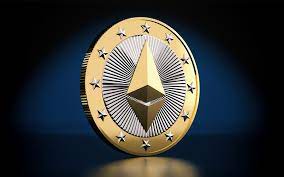About Ethereum
Trade Ethereum In Ghana 2023: For those who are not too conversant with cryptocurrencies, Ethereum is a decentralized blockchain platform with smart contract functionality. This means that one can store executable programs on the crypto coin which run automatically when a pre-determined condition is met, this is the major difference between Ethereum and other types of cryptocurrency.
Vitalik Buterin created Ethereum in 2015. Ethereum is a different innovation compared to Bitcoin (primarily a crypto coin that uses blockchain technology), Ethereum is a platform built on the blockchain in which anyone can run a decentralised app to offer a different array of services.
Popularly, Ethereum is used to provide decentralized finance (DeFi) services as well as a platform to create and trade non-fungible tokens(NFTs). Ether (ETH) is the currency of the platform and is the second most popular crypto coin after bitcoin.
The blockchain is a public record of all transactions that occur on the network. Every time a cryptocurrency transaction is made, the transaction block needs to be added to the record to be considered complete. To do so, blockchain has conventionally relied on the Proof of Work system.
How to trade Ethereum in Ghana 2023

To trade your Ethereum in Ghana, you need to get a reliable platform to use. Ghanaians have been on the cryptocurrency trend over the year and this has attracted lots of cryptocurrency trading platforms to the country, one of which is Dart Africa.
Dart Africa is a reliable trading platform in Ghana and has been trusted by many over the years. Thanks to the modern exchange platform we have been able to provide an amazing service to our customers.
Our platform is available on both the Web and mobile app (Android devices). We have designed our platform with a great User Interface and User Experience design, which has made our platform very easy to use. With just few clicks on our website, you can successfully trade your Ethereum for Cedi.
How To Trade Ethereum In Ghana
- Go to Dart Africa’s website or download the mobile app.
- Log in to your account with your credentials or create an account if you don’t have one.
- Navigate to the sell coin interface on your account dashboard.
- Click on Sell Coins.
- Select Ethereum as the cryptocurrency you want to sell in the coin column.
- Enter the volume of the Ethereum you want to sell, and the corresponding USD and Cedi amount will be displayed in columns. Note: the minimum dollar price of ETH or any cryptocurrency you can sell is $20.
- Click on sell coins now.
- A wallet address will be provided coupled with a QR code. You can send the crypto amount you selected from the step above by manually inputting the address or by scanning the QR code. Your Dart Africa wallet will be credited immediately after confirming the crypto transaction.
Also read: Fastest crypto trader in Ghana

Ethereum migrates from Proof of Work System to Proof of Stake – The Merge
Ethereum, the world’s second most popular crypto coin shifted to a proof-of-stake system for transaction validation on its blockchain. The shift culminated with the much-awaited “The Merge”, which occurred in mid-September. Here’s everything you need to know about this change.
First, What is Proof of Work (PoW)?
Since there is no central authority in the crypto world, The system as to rely on a distributed network of miners to verify transactions. Miners have to use complex calculations to verify each transaction. Miners are rewarded with new units of the crypto token for their work.
This is a lucrative task that attracts a lot of interest and miners need to demonstrate work to earn the rewards. Networks pose complex mathematical problems that need to be solved and the miner who solves them first gets the right to add transactions to the block and earn the reward. This sets off a race among miners who end up setting up high-end computing infrastructure to beat other miners.
During cryptocurrency bull season, firms were buying a whole power plant, sometimes gas or coal-powered, to keep their infrastructure running and mine tokens, particularly Bitcoin. Since there is only one winner for each proof of work, the entire process has high redundancy and there is an enormous waste of energy.
What is Proof of Stake?
In comparison, the Proof of Stake (PoS) system relies on the network participants staking their crypto coin holdings, which can either be used as collateral or even destroyed if the user behaves dishonestly. In the case of Ethereum, a miner needs to stake 32 ETH to participate in the system, which at the time of writing is equivalent to US$52,440.
The choice for who validates each transaction is then made at random using an algorithm that is weighted based on the amount of stake and the validation experience instead of the old thug-of-war contest. After a miner verifies a block, it is added to the chain, and the miner receives a fee in cryptocurrency. Making miners put up a stake provides security as it should make them less likely to steal tokens or commit fraud, and by eliminating redundancy, Ethereum claims it will reduce Ethereum’s energy consumption by up to 99.95 per cent.





